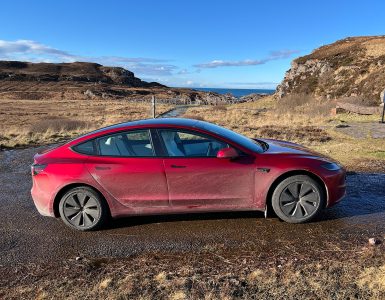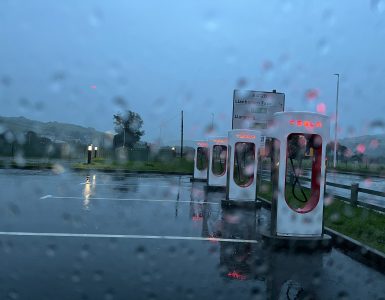There are some very common but really inaccurate misconceptions about driving electric cars that are still widely believed. One is that you can’t do high mileages or long trips in an electric car and that is takes hours to charge an EV.
So we’re doing some #EVDayTrips to bust some these myths and show what electric cars trips are really like. These extremely long trips in the UK to show you can do it in an EV. Our first trip was Putney to Padstow and back in a day.
There really is no reason and no excuse to buy another premium brand oversized diesel SUV or saloon for £35,000 or more just because you do a long trips to Cornwall, Wales, Scotland Norfolk, Gloucestershire etc. or do high mileages for work. The days of needing a piston diesel or petrol car burning fossil fuels and polluting the air in order to do a long trip are simply over. Even smaller cheaper EVs with faster charging can manage long journeys too.
London to Pembrokeshire in Wales.. and back again in a day
In this second “EV daytrip”we drove our trusty 2019 Tesla Model 3 267 miles from Putney (in SW London) to Dinbych-y-pysgod also know as Tenby on the Pembrokeshire coast in Southwest of Wales. For reference google maps currently says this a 193 mile journey with a drive time of 4 hours and 32 minutes as I write this.
While Tenby was on my list of “EV day trips” I had actually planned to head to Holyhead in Anglesey (North Wales) but decided to change to a shorter trip after some SW London traffic it took nearly an hour to even cross the Thames!
Choosing an EV for longer trips – battery size and charging speed
People do long trips in all sorts of EV’s but 2 factors make it much much easier. An official range of between 200 and 350 miles helps a lot but the ability to charge to 80% in half an hour or less on DC rapid charging is crucial. To achieve this look for electric cars whose charging in kW at least double the size of their battery in kW/h.
A kilowatt-hour (kWh) is a measure of the amount of energy stored in your battery and the charging speed in kW is the amount that would be added in one hour. So if a car charged a 50kWh battery at a steady 50kW then 0-100% would take an hour while a slow AC charger at 10kW speed would take 5 hours. In reality charging speed slows from around 50% battery charge and becomes very slow beyond 80%. Luckily most owners will have at least 10% battery left when they start a charge and will unplug before 80% which keeps the times roughly in line.
When less well informed journalists or others refer to charging times in hours they are referring only to slow AC charging that you would use for top ups or overnight charging at home usually at a maximum speed of 7kW to 11kW. Most EVs (except Renault Zoe’s that depend on 25kW AC) can switch to fast DC CCS charging when on a trip to charge at between a pedestrian 50kW and a super fast 350kW. It’s DC charging speed that matters if you want to charge in 30 mins or under on a trip.
The trip

The stats
- The Tesla Model 3 left Putney at 0749am with an indicated range of 241 miles
- The whole trip was 474.5 miles and used 129kWh of electricity which works out at 272Wh/mile
- It was back in Putney at 21:01pm with 169 miles range remaining on arrival
The charging stops
The best way to charge EV’s on a long trip is usually more short charge stops of 15 to 25 mins rather than a long single charge stop. Charging from 10% to around 60% is much much faster than charging all the way to 100% and let you stretch your legs and have a tea and toilet stop.
Stop 1 At 65.9 miles
Some really bad traffic in Southwest London meant that after nearly 2 hours I hadn’t covered much ground but needed a toilet and coffee stop. While stopped anyway, the Tesla refreshed itself on a Tesla Supercharger at Membury in Wiltshire on the M4. The car did not need the charge. Time charging was 7 mins which added +31 miles departing with 193 miles range. Cost £2.56
Stop 2 At 163.9 miles
Tesla Supercharger stop Sarn Park Services off the M4 between Cardiff and Swansea near Bridgend in South Wales. Although Starbucks isn’t my favourite coffee spot the location is close to the Motorway and modern with an outdoor terrace. The charge took 23 minutes adding +152 miles taking range from 80 miles to 232 miles for £12.09
Stop 3 At 237.3 miles
Arrival at my destination in Tenby. I randomly picked the Five Arches Car Park for its central location and discovered a line of working Pod Point chargers with free bays. Not only did this mean I could top up slowly for my entire visit but it also gave me a row of free bays to choose from in an otherwise full car park. They are slow AC chargers but if you’re there anyway it’s simply a bonus charge that saves you time on the way home. Please note charging doesn’t dodge the car park fee. I paid a £7 rest of the day rate. In 3 hours and 13 mins the AC chargers added +87 miles taking the range from 155 miles to 243 miles . Cost £5.80
Stop 4 At 407 miles
Back at Membury services but needing more than a sip of charging after arriving from Wales with 29 miles charge! In a 30 minute charge I went from a range of 29 miles to 241 miles which is +212 miles for a cost of £17.60. That’s a 9% to 82% charge.
Stop 5 back at home in London
Arrived back with 169 miles range remaining having left with 241 miles.
Pictures of the Tenby
Tenby is an absolutely beautiful seaside town and I am so glad to have some time to explore it after having thought about it for long. Thank you Wales for some sunning scenery, great beaches and a warm welcome.
Summary
- Total charge time 60 mins on the round trip journey + the additional charge at the destination
- The 474.5 mile trip cost £38.05 while consumption on a largely motorway trip was 272Wh/mile
- To go back to the departure state of charge would have been a further £4.30 or so on my local 24p per kWh Ubitricity lamp post
- The outbound journey took 5 hrs 20 including 30 minutes charging and the return leg took 4 hours and 30 minutes
Most people would regard London Tenby return as at the outer reaches of what most drivers would find feasible in a day. 475 miles may not sound massive but London to Edinburgh one way is only 407 miles while London to Inverness is 569 miles according to Google maps. The fact the Model 3 averaged 91.9% of the standard predicted range ( which on this Model 3 is based on getting 4 miles per kWh is very impressive). It’s worth noting that the car could have been charged for under 60 minutes and still reached London easily or been driven around 155 miles further making the total miles driven + remaining range around 683 miles on the same charge time. In fact on a journey this length staying fresh with regular short stops are what responsible drivers should do anyway.
Could a non Tesla electric car manage this with the same charging time or less? I hope some other EV owners will put that to the test in future. The Model 3 does benefit from being very efficient and having access to its own very fast reliable charging network. Cars like the Kia e-Niro & Hyundai Kona can match the efficiency but not the charging speed while cars like Audi e-Tron 55 can match the charging speed but not the efficiency. In a single direction (which after all is what a normal drive to Tenby would be) I think many EV’s could match the charge times. On a day return I think the Model 3 still has the edge.
However the arrival later in 2021 of the roughly £40,000 Kia EV-6 and Ioniq 5 with charging as quick as a Model 3 and similar range will open up the race provided the UK can start installing some public chargers faster than 50kW.
In March 2021 an incredible 76% of new DC charger installations were still only up to 50kW speed. Of the 24% of chargers over 50kW 12% were Tesla Superchargers, 2% were Ionity 350kW units and just 8% were chargers between over 51kW and 175kW by all other networks combined. 50kW is already slow for a road trip and will be a limiting factor unless we get a majority of DC charger installations up to the 100kW to 150kW speed.
It looks like the new Gridserve/ Ecotricity 350kW chargers could make a big difference here. The first has gone in at Rugby services and if scaled across the motorway network should enable all EV’s to get that Tesla feeling on long journeys as they should and need to.


















[…] show you can do it in an EV. Our first trip was Putney to Padstow and back in a day.The second was Putney to Tenby return. Including this trip to Scotland the 3 EV day trips to date add up to 1,678 miles or […]
[…] show you can do it in an EV. Our first trip was Putney to Padstow and back in a day.The second was Putney to Tenby return while the third took it up a notch…London to Scotland and back in a […]
[…] in an EV. Our first trip was 527 miles Putney to Padstow and back in a day.The second was 475 miles Putney to Tenby return while the third took it up a notch…671 miles London to Scotland and back in a day! […]